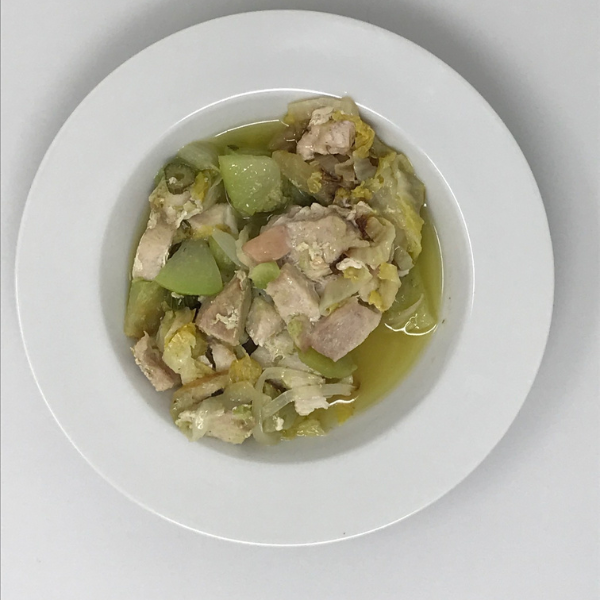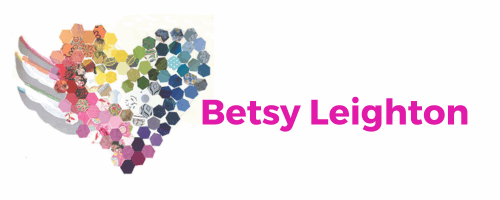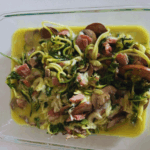This post provides an intro to my favorite new guilt-free vegetable, the humble Choko or Chayote Squash.
As an Amazon Associate, I earn from qualifying purchases.
Table of Contents
What is MCAS?
Mast Cell Activation Syndrome (MCAS) is a chronic condition that affects all organ systems. MCAS is serious and disabling and people with MCAS experience often significant and debilitating symptoms daily, including anaphylaxis, which can be fatal.
MCAS is often found in combination with other chronic conditions such as Ehlers-Danlos Syndrome (EDS) and Postural Orthostatic Tachycardia Syndrome (POTS).
Frequently healthcare providers do not know about MCAS, and the tests for MCAS are problematic because they are not uniformly reliable. MCAS can be difficult to manage. Treatments include blocking mast cell mediators with anti-histamines and mast cell stabilizers, as well as avoiding triggers.
Check out this post on how to manage MCAS.
What are salicylates?
Salicylate is a natural chemical found in plants that protects them against disease, bacteria, fungi, and insects. It is found in varying amounts in foods and drinks that we consume, including vegetables, fruits, nuts, spices, alcohol, coffee, and tea.
Salicylates are problematic for some people with MCAS because they can build up in the body and compromise liver function.
Why this guilt-free vegetable?
Chokos are low in salicylates making them ideal for replacing higher salicylate veggies in standard recipes when you have MCAS or other chronic illnesses. You can use chokos in place of zucchini, broccoli, potatoes, and even apples and pears. There are hundreds of recipes online for using chockos in everything from stirfry, to gratins, to souffle, and even in tarts. In the recipe below I provide a delicious chicken veggie tray bake with choko.
Eating a diet lower in carbs and inflammatory foods can help to control histamine intolerance. To learn more about the lower histamine Keto diet click here!
The bucket theory
The bucket theory offers a helpful analogy for understanding symptom reactions with MCAS.
Think of your body as an empty bucket that you want to keep from overflowing. Different foods and activities fill your histamine bucket at different speeds but combine to form the total level of histamine in your body (how full your bucket is). A fuller bucket means you have more histamine symptoms. When you manage triggers, reduce exposure to known triggers, and take medications and supplements to reduce histamine, you can manage the level of your bucket.
Know your typical symptom progression
Knowing your symptom progression in a symptom flare is the key to developing your own rescue plan. In this post, I discuss how to determine your own symptom progression. Once you know what typically happens in your symptom progression you can design a rescue plan to address those symptoms.
Get my free ebook, symptom log, and meal plan!
Want a tool to easily keep track of your symptoms? Sign up for my newsletter and you will receive my free 50-page ebook of lower-histamine, grain-free, sugar-free, Keto recipes, my free symptom log, and a free two-week meal plan!
Where to find this guilt-free vegetable?
Choko, chayote (Sechium edule), also known as mirliton and chayote squash, is an edible plant belonging to the gourd family, Cucurbitaceae. This fruit was first cultivated in Mesoamerica between southern Mexico and Honduras, with the most genetic diversity available in both Mexico and Guatemala.

Chokos are available at many modern grocery stores in my area of the Midwest, perhaps because we have a sizable population of Mexican people.
What do chokos look like?
Here is a photo of a choko after being sliced.

Here is another photo of a choko that has been halved. You want to remove the seed in the center as well as the fibrous part surrounding the seed.


Cooking with this low-salicylate vegetable
I’ve read that the choko is considered a fruit, but it can be used in recipes that call for vegetables as well.
Chokos are extremely versatile and can be made into both sweet and savory dishes, or even eaten raw.
Ingredient notes for this low-salicylate vegetable recipe
The following recipe calls for my Lower Histamine Pesto which you can find here! I love this recipe when made with the garlic scape version of my Lower Histamine Pesto!

Here’s a recipe for Choko Chicken Tray Bake!
Choko Chicken Tray Bake
Equipment
- rimmed baking tray
Ingredients
- 1¼ lb chicken breast, skinnless partially frozen
- 1 ripe choko, or chayote squash peeled, seeded, and sliced thinly
- ½ medium onion sliced thinly
- 4 cups napa cabbage sliced thinly
- ¼ cup avocado or olive oil
- 3 tbsp Lower Histamine Pesto garlic scape pesto is ideal for this recipe!
- 2 tsp sea salt
- 1 fennel bulb trimmed and sliced thinly
Instructions
- Preheat the oven to 400 °F.
- Place 2 T. of the oil on the baking tray. Arrange the chicken cubes and vegetables in rows on the tray. Place dollops of the pesto evenly on the contents of the tray. Drizzle with remaining oil and sprinkle the salt evenly over everything.
- Place the tray into the oven and roast for about 25 minutes, until the cabbage is starting to carmelize and the chicken is done to an internal temperature of 165 °F.
- Remove the tray from the oven and serve immediately or portion into glass containers for freezer storage.
Sign up for the SSP!
The Safe and Sound Protocol (SSP) is a listening therapy based on Polyvagal Theory created by Stephen Porges to unlock your ability to think, feel, and connect better through nervous system regulation. You use the SSP via an app on your phone and listen with over-the-ear headphones to specially filtered music that heals the nervous system, specifically the vagus nerve. You subscribe to the app with a provider like me and listen to the specially curated music for 30 minutes each day for a 5-hour cycle. Studies show the SSP has a profound effect on mental health and chronic conditions
You can sign up for the SSP here!
Order my book!
Rocks and Roots chronicles my journey solo backpacking the Superior Hiking Trail and overcoming nervous system dysregulation, gut dysbiosis, and Mast Cell Activation Syndrome symptoms to hike 328 miles successfully.
Check out this powerful frequency device
Healy is an individualized microcurrent device I use to reduce inflammation. Check out this post for more about Healy.
Sign up for a session!
I provide one-on-one in-person and remote chronic illness and caregiver coaching and Sacred Self-Healing Sessions based on the Sacred Self-Healing Method, a proven novel co-creative healing modality detailed in my Books.
Click here for more information.
What do you think?
I’d love to have your reply below!
Disclaimer
The preceding material does not constitute medical advice. This information is for information purposes only and is not intended to be a substitute for professional medical advice, diagnosis, cure or treatment. Always seek advice from your medical doctor.


